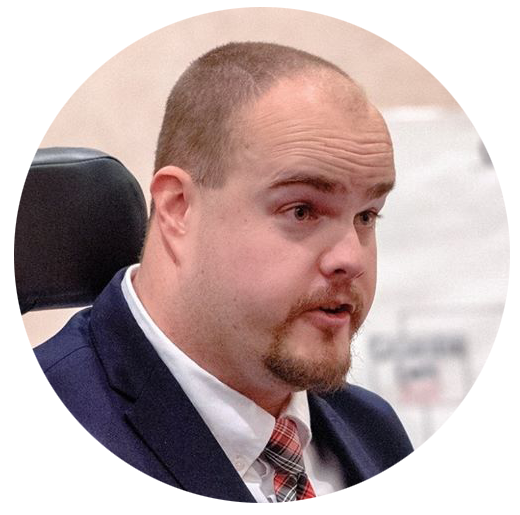
Image adapted from Wikicommons by DhLeaks44 / CC BY-SA 4.0
“Judge Not: The Problem with Georgia’s Charge about Religious Objection to Jury Service”
Matthew P. Cavedon
At the start of most criminal trials in Georgia, the judge gives those called for jury duty a quick overview of the jury selection process. This includes warning them that the attorneys might ask “whether there is anything that would make you reluctant to sit in judgment of another person.”1Ga. Pattern Jury Instructions, Crim. Cases § 0.00.10. “The purpose of the question,” the judge explains, “is to find out if you have any religious holding that would prevent you from voting your decision or conscience in the jury room.” Then, the judge delivers a bit of a sermon, clarifying that objections to jury duty on religious grounds exist “for certain religious denominations and some people,” but “as jurors, you are not being asked to judge someone or sit in judgment of someone in a religious sense. You are merely being asked to determine the truth of the facts of the case.”
Well-intentioned though this charge might be, it ends up turning the judge into a religious authority. At best, the instruction sounds dismissive of actual religious scruples: “Although some ignorant people might believe that jury service is improper, I assure you that it is not actually religiously problematic.” At worst, it has the potential to mislead jurors into thinking that no one actually has a religious objection to jury service. The charge should be revised to be more precise, and neutral toward religious beliefs.
Religious objections to jury service are not very common. But there are Christian readings of the New Testament that forbid sitting as a juror, as a form of judging other people or as unacceptable participation in government. Here is one church’s particularly thorough analysis of this position, emphasizing the Christian duties to be an ambassador for Christ, avoid judgment of others, and show mercy. Another anecdote from The Jury Expert describes two potential jurors in a death penalty trial raising religious objections – not to deciding the possible sentence, but to sitting in judgment of others at all.
Christians are not the only objectors. A British man recently responded to a jury summons by telling a judge, “As a Muslim I believe you shouldn’t judge anyone and can’t come to any decision regarding another person. I could not take the responsibility of judging a person innocent or guilty. I believe we are judged after our death and I would hate to think an innocent person would suffer because of the evidence and my decision.” (Whether he knew it or not, he was actually echoing the original justification in English law for requiring proof of a crime beyond a reasonable doubt – to keep a juror out of the damnation that might follow from wrongly convicting an innocent defendant.)

“The Jury” by John Morgan. 1861. Bucks County Museum in England. Wikimedia.
It is tempting for courts to respond to objections like these by clarifying what jurors are and are not tasked with doing. But Georgia’s jury charge goes too far when it flatly states that jurors are not “asked to judge someone or sit in judgment of someone in a religious sense.” This confuses a judge for a theologian, and in other contexts, this is roundly rejected. For instance, a few years ago, the U.S. Supreme Court decided that for-profit companies could raise religious objections to covering employees’ contraceptives. During that case, the government’s “main argument . . . [was] basically that the connection between what the objecting parties must do (provide health-insurance coverage for four methods of contraception that may operate after the fertilization of an egg) and the end that they find to be morally wrong (destruction of an embryo) [was] simply too attenuated” for the law to burden their religious beliefs. The Court dismissed this contention, holding that “it is not for us to say that [the objectors’] religious beliefs are mistaken or insubstantial.” This followed from an earlier decision where the Court forbade the government from deciding whether someone’s belief is “acceptable, logical, consistent, or comprehensible to others” – or even coherent on its own terms.
But Georgia does just that when it has judges tell jurors that their religious beliefs do not in fact forbid jury service. This may be a minor, well-intentioned foray into the realm of moral theology. But as Justice Jackson wrote so eloquently decades ago, “If there is any fixed star in our constitutional constellation, it is that no official, high or petty, can prescribe what shall be orthodox in politics, nationalism, religion, or other matters of opinion.”What should be done? Georgia judges should clarify the role of jurors, but in a way that remains agnostic about whether that function conflicts with religious beliefs. Tell people that jurors only decide whether certain facts have been proven, not whether a person is good or bad in an ultimate sense. Then, let them decide whether this counts as judging in the religious sense, and if so, whether they must opt out. Let judges teach about legal judgment, but hold their tongues as to the religious kind. ♦

Matthew P. Cavedon is a criminal defense attorney in Gainesville, GA. He graduated from Emory University in 2015 with a law degree and masters of theological studies.
Recommended Citation
Cavedon, Matthew P. “Judge Not: The Problem with Georgia’s Charge about Religious Objection to Jury Service.” Canopy Forum, July 24, 2020. https://canopyforum.org/2020/07/24/judge-not-the-problem-with-georgias-charge-about-religious-objection-to-jury-service/

